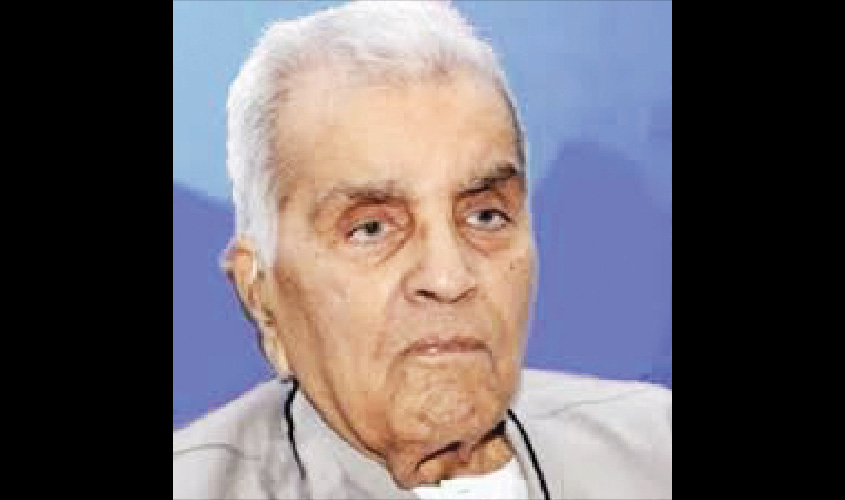Rajindar Sachar, former Chief Justice of the Delhi High Court, passed away on 20 April; he was 94. His cremation was attended by many of his admirers, as he was a man who always stood by principles and who remained an indefatigable crusader for democratic and human rights. At a time when minority rights have taken such a beating in our country, his passing away is indeed a profound loss for the human rights movement. Sachar was known for his honesty and courage; he took a stand against the Emergency and worked for the freedom of press and the independence of the judiciary. He, however, became known for the Sachar Committee report that documented the status of the minorities in contemporary India. The report brought to light the abysmal situation the Muslims are in, both in terms of education and employment. It documented the growing social and economic insecurity that had been imposed on Muslims since Independence and revealed how grossly under-represented they were in the bureaucracy, military and in politics. Muslims were more likely to be poor and illiterate and were accused of being against the Indian state as they were being falsely dubbed as “terrorists”. The Sachar Committee recommendations aimed to promote the inclusion of the minorities in India and became a landmark in the debate on the status of Muslims in India.
Born in Lahore on 22 December 1924, Sachar’s father was freedom fighter Bhimsen Sachar, who later became the Chief Minister of Punjab. Sachar studied law in Lahore, where along with his classmate and close friend Kuldip Nayar, he imbibed the spirit of the freedom struggle and together attended rousing rallies. He later married Kuldip Nayar’s sister, Raj, while and Kuldip Nayar married Rajindar Sachar’s sister, Bharti. Both Nayar and Sachar remained steadfast to their commitment to human rights and were always seen at every protest in the national capital. Their respective wives supported them from their homes.
Sachar was the Chief Justice of the Delhi High Court from 6 August 1985 until his retirement on 22 December 1985. He was also appointed the Chief Justice of the Sikkim High Court. He was known for his progressive judgements. He was a signatory against the US invasion of Iraq and against Section 124A of the Indian Penal Code, which outlaws disaffection against the state, and allows for penalties of life imprisonment. Sachar would say, “For having a democratic society, it is necessary that these laws go.” He participated in the Indian People’s Human Rights Tribunal inquiring into a massive slum clearance drive in Mumbai. The demolitions in January 2000 had been undertaken despite a notification from the state government to stay the demolitions. The poor had not been allowed to take their precious belongings from their homes, which had been demolished. Sachar described the scene as “barbaric, savage. It’s as if a bomb has fallen here.” Undeterred by age, Sachar continued his relentless activism and was detained by the police at the India Against Corruption protests, at the age of 87. His short-statured and frail figure packed with hard-hitting speeches pervaded all democratic rights meetings. He could be seen at Jantar Mantar, lighting a candle at India Gate, or speaking at the Gandhi Peace Foundation with erudition. However, simplicity and humility remained his hallmark. He always gave space and time to the younger generation saying, “You have to lead now”.
Once when I expressed concern at his being in the pell-mell of demonstrations at his age, he looked at me baffled. When I explained that his sister, Bharti Nayar, was concerned for his health and had asked me to convey to him that he should reduce his visits, he smiled and said, “When I come to the movement, it’s like a blood transfusion”. Sachar brought blood transfusion to the movement as well. He was also the president of the Peoples’ Union of Civil Liberties, founded by Kuldip Nayar and Justice Tarkunde in the aftermath of the Emergency. The PUCL is a vanguard institution and has taken up innumerable cases that tampered with the rights of the poor.
He is survived by his son Sanjiv, daughter Madhavi and three grandchildren and though he led a long and full life, he will be terribly missed by those of us who were inspired by his humble style and high standards of commitment. Warm salutations to this noble soul, who always spoke for the voiceless. There will be a memorial for him on 23 April, Monday, 5 pm at Siri Fort, New Delhi.
Sagari Chhabra is an author and film director
Rajindar Sachar was a regular contributor to this newspaper.

